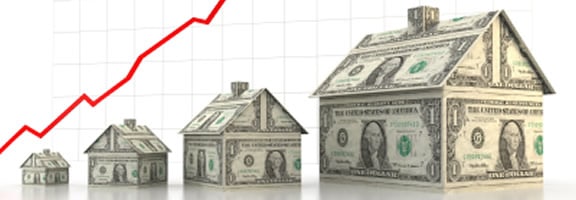I’ve noticed several news stories during the last few months that raise doubts about whether home ownership remains a path to building wealth. Typical of this perspective is David Streitfeld’s piece in The New York Times (August 22, 2010), “Housing Fades as a Means to Build Wealth, Analysts Say.”
The analysts quoted argue that 1) there is no iron law that real estate must appreciate; 2) housing values will keep pace with inflation in coming years, but that’s it; 3) negative changes in the economy will reduce housing demand in the future, which will keep a lid on appreciation.
Streitfeld quoted the experiences of two homeowners to illustrate the analysts’ points. One involved a couple who bought a Chicago condo in 2003, watched it quickly appreciate by $50,000 and can’t find a buyer — at an unspecified price — in 2010. The other describes a Phoenix lawyer who paid $200,000 for his home in 2000, saw a similar home rise to $500,000 five years later and now figures his home is worth what he paid for it. He laments that he can’t sell his house, buy a boat and sail around the world.
I am the first to admit that a number of factors inflated residential real-estate values beyond reasonable, sustainable and sensible numbers in many places — both rural and metropolitan — between 1990 and 2006-7. Buyers paid too much for too little. Lenders extended credit to risky borrowers for too much, because they could dump the mortgages into pools, thus getting out from under any risk. Brokers and sellers benefited from inflated selling prices, so they had no incentive to put on the brakes. Speculators fed on their own frenzies. Like any Ponzi scheme, everyone won until the inevitable losing started.
If 2000-2010 is the baseline data on which a home-is-not-a-good-investment analysis is based as it is with the two homeowners Streitfeld quotes, then his conclusion is confirmed. It’s called cherry-picking the data.
Both individuals cited in the story expected the 2000-2006 annual appreciation rates to continue forever, even improve. That is, they expected the bubble to keep getting bigger. Their stories tell us nothing at all about whether or not home ownership is a good investment. They do show us that it’s best to get out before a bubble pops.
Residential housing, like any other place where invested capital can appreciate or not, succeeds as an investment according to the price the buyer paid for the intrinsic value obtained, the terms of the purchase, the length the asset is held, the timing and terms of the sale, the condition of the asset when it’s marketed for sale, the net effect of changes in the neighborhood during the time of ownership, the cost of money, tax laws and a dozen other purchase-specific factors.
I can’t predict the future any better than the three analysts Streitfeld quotes for their pessimistic views on homes as an investment. But even accepting a 15- or 20-year period of 1 percent average annual GDP growth (instead of the more or less common assumption of 3 percent + or -), buying a home today…at a sensible price, at today’s interest rates, with today’s tax-deductibility for mortgage interest and (most) property taxes, with the current exclusion of a certain amount of capital gains from taxation on the sale of a principal residence and with the current estate-tax breaks for the passing of property to spouses, among others…looks like a safer and more profitable long-term investment than any alternative available to average Americans.
No other investment is as tax advantaged. If you think of a home purchase as an investment in a business, no other alternative business investment can be leveraged so highly or at such low interest rates. Most businesses would love to be tax-treated as homes are.
The conditions for making homeownership work as a business investment are: 1) hold it for at least 15 years, longer is better; 2) get a low, long-term fixed-rate mortgage that, preferably, you hold for its term (paying it off before term raises the effective interest rate because of interest front-loading); 3) don’t buy more house than you can currently and foreseeably afford; 4) don’t buy with the idea of flipping in a couple of years or speculating on trends; 5) have enough liquidity to ride out a year or more of unemployment; 6) don’t gamble on sketchy neighborhoods or sketchy properties; and 7) don’t overpay for what you’re buying.
Habitat for Humanity makes homeownership available for low-income buyers. I think the country would be better off if we applied some form of the Habitat model for marginal buyers rather than keeping them locked in and locked up in dead-end rental housing. The model I have in mind is not offering no-doc, risk-shifted, subprime loans with killer ARM terms to poor folks, which is the model that was used in the go-go years, not that far back.
Investing in a home is not opening a piggybank account. Equity buildup should be for long-term objectives like retirement, not short-term gratifications like sailing trips. (I write this as a sailor.)
As retirement accounts go, I would take a 30-year home purchase as outlined above against any alternative retirement investment, including a ROTH IRA. With private pension plans scaling back or disappearing and Social Security on the road to tighter eligibility standards and perhaps lowered benefits, homeownership is the least risky retirement account available to middle-income and blue-collar Americans.
Purchased stupidly and for the wrong reasons, a home investment will tank like any other investment purchased stupidly and for the wrong reasons. But, in my opinion, its many current advantages still outweigh the risks compared to the alternatives, especially if the future is dismal.
This content may not be used or reproduced in any manner whatsoever, in part or in whole, without written permission of LANDTHINK. Use of this content without permission is a violation of federal copyright law. The articles, posts, comments, opinions and information provided by LANDTHINK are for informational and research purposes only and DOES NOT substitute or coincide with the advice of an attorney, accountant, real estate broker or any other licensed real estate professional. LANDTHINK strongly advises visitors and readers to seek their own professional guidance and advice related to buying, investing in or selling real estate.









I’m just curious about whether or not a home is really an asset that can be considered an investment. I see it as a liability.
Even if used for retirement, if it isn’t making any money, it’s not an investment, it’s always going to be a liability, because of taxes, maintenance costs, etc. As long as you are putting out money and it isn’t bringing in an income, even if you hold it for 15 years, it isn’t an income property.
I see people buying homes to flip, but they just sit there, and they pay and pay to maintain them, and they deteriorate right before our eyes when they aren’t sold.
At what point does a person realize they do not have an asset, but rather, a liability?
I agree with you – a house isn’t an investment. Not these days anyway. It’s a money pit.
However, an investment is not qualified by it’s ability to produce income. Other than dividends, stocks don’t really produce income until (and if) you sell it for more than you paid. If not, then it’s a liability too.
Let’s say you buy 100 acres today for $100,000 cash. Over the next ten years, the only money you spend on the land is taxes that total $10,000. Now you’re in the land after 10 years for $110,000. Then you sell it for $200,000. The land produced zero income while you owned it, but you made $90,000 at the sale. Is that not called an investment?
Ryan, with that scenario, I agree, the land is an investment. I wish banks would tell people how it really works. Instead, they convince people when they buy a home, they are buying an asset. That’s a half-truth. Most people buy their homes to live in them, and they are misled thinking a home is an investment.
The average person doesn’t realize their home is a liability. They buy into inflated loans that they will never be able to pay back (and will probably be foreclosed or pay the rest of their lives) and the loan is cushioned.
When I went to buy a house, I was asked to take out a loan that was more than the asking price of the house. Their reason? Why not just consolidate and pay off all your debt? Why not borrow extra so you can add (fill in the blank) to your home?
By the time a person is done buying the property, they have paid way more than the property is really worth, and they have to sit on it because they can’t resell for a profit.
I want to go look for land, but when I found Landflip and Landthink, I decided to wait. I’m getting educated before I look for land. LOL I’m glad I didn’t go for the loan.